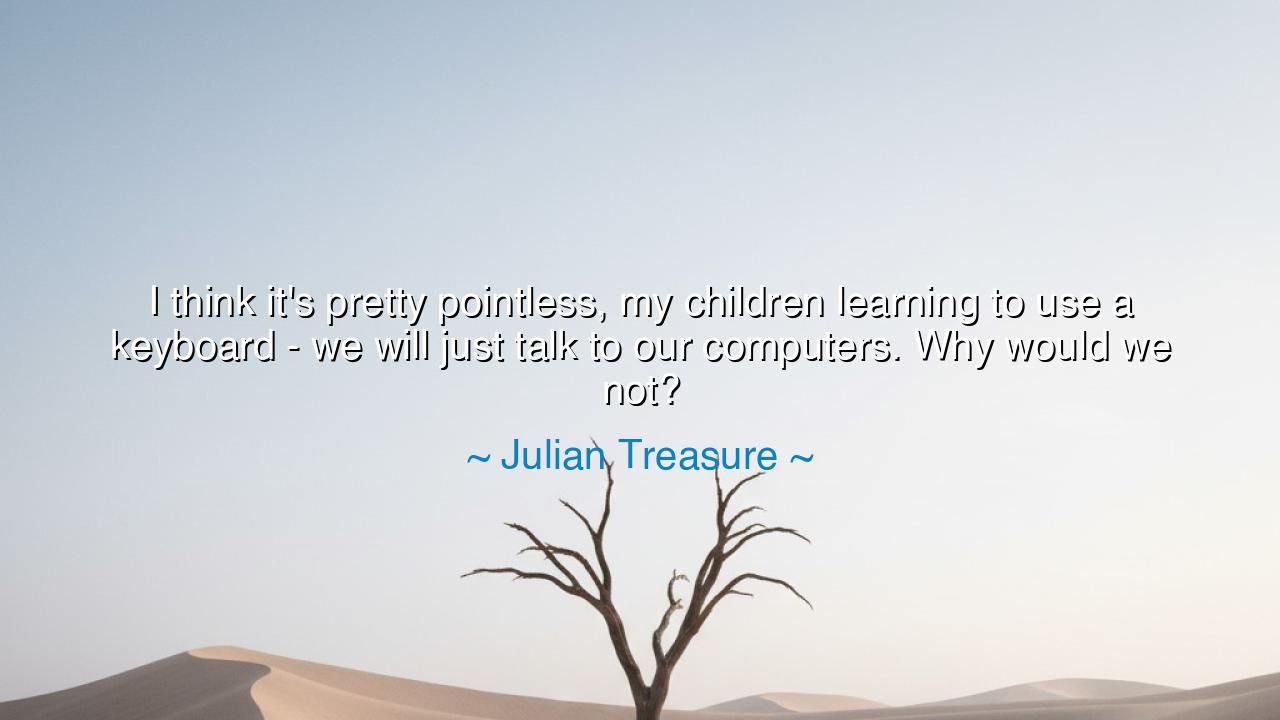
I think it's pretty pointless, my children learning to use a
I think it's pretty pointless, my children learning to use a keyboard - we will just talk to our computers. Why would we not?






Hearken, O children of generations yet unborn, and attend to the words of Julian Treasure, who gazed upon the future of human communication with foresight and candor: “I think it's pretty pointless, my children learning to use a keyboard — we will just talk to our computers. Why would we not?” In these words lies a profound meditation on adaptation, innovation, and the evolving relationship between humanity and technology, as relevant today as the musings of philosophers of old.
Consider first the shift from manual input to spoken dialogue. Treasure predicts a transformation in how humans will interact with machines: that the rigid dance of fingers upon keys will give way to the fluid grace of voice. This mirrors the ancient human pursuit of efficiency and alignment with natural faculties. As the Greeks and Romans once designed aqueducts to follow the curves of the land, so too must our communication bend toward the path most natural and intuitive—the voice, the breath, the spoken word.
The wisdom of this insight lies not merely in convenience, but in the profound power of sound and speech. Treasure, a master of listening and vocal presence, reminds us that the voice is ancient, elemental, and universal. Writing, though transformative, is a tool of mediation; speaking is immediate, vibrant, and alive. Consider the orators of Rome, who swayed the Senate and the people not with gestures upon parchment but with the resonance of words carried on the air, shaping thought and action alike.
Treasure’s words also hint at a deeper philosophical truth: the evolution of tools follows the evolution of human nature. Just as the quill replaced the chisel, and the printing press replaced the scribe, so too will speech replace typing. A modern echo of this principle is the rise of voice assistants and AI-driven speech interfaces, from Siri to Alexa, which allow humans to command, query, and create without intermediary devices. Adaptation to natural faculties ensures mastery and liberation, not mere convenience.
There is also a story of Thomas Edison, who labored to perfect the phonograph, a device that would capture and reproduce the human voice. His invention, though once marvel and novelty, transformed communication, entertainment, and education. Like Treasure’s vision, Edison understood that the voice carries a power beyond mere representation, shaping memory, emotion, and action in ways no mechanical input could match.
From this reflection emerges a lesson: seek the tools and methods that align with the human spirit and natural ability. To labor at obsolete methods is to resist evolution; to embrace intuitive technologies is to amplify potential. Treasure’s insight calls us to cultivate foresight, to anticipate change, and to prepare our children for a world where communication is direct, efficient, and alive, where the human voice becomes both instrument and interface.
Practical action flows naturally from this wisdom. Encourage exploration of voice-driven technologies and natural interfaces. Teach children to articulate clearly, to listen deeply, and to harness the power of speech as a tool for learning, creation, and influence. Observe emerging trends in technology, and align skills with those that enhance natural faculties rather than replicate outdated methods.
Finally, remember the eternal truth: the evolution of humanity lies in harmony with the tools we create. Julian Treasure’s words are a clarion call to embrace the future of communication, to honor the power of voice, and to prepare for a world where machines respond to speech, not keystrokes. In doing so, we reclaim immediacy, vitality, and the human essence in every act of creation and interaction.
If you wish, I can also craft a narration-ready version of this reflection, with rhythmic rises and falls, emphasizing the heroic and visionary tone of Treasure’s insight.






AAdministratorAdministrator
Welcome, honored guests. Please leave a comment, we will respond soon